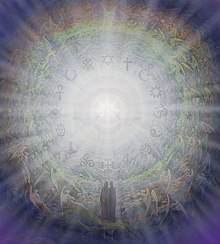Logos
Appearance




Logos (Greek: λόγος, from λέγω "I say") is an important term in philosophy, psychology, rhetoric, and religion, which has been used in diverse ways. Heraclitus used it to refer to a principle of order and knowledge; Stoics used it to refer to the divine animating principle pervading the Cosmos, and Philo adopted the term into Jewish philosophy. In Christianity, the Gospel of John identifies the Logos as divine and Jesus as the incarnate Logos.
A
[edit]- The watch-maker has in his head an idea of the system of a watch, before he makes it. The mechanician of the universe had a complete idea of the universe before he made it, and this idea, this logos, was almighty, or at least powerful enough to produce the world; but it must be made of matter, which was eternal. For creation out of nothing was impossible, and matter was unmanageable. It would not and could not be fashioned into any system, without a large mixture of evil in it, for matter was essentially evil.
- John Adams, 28 June 1812, in a letter to Thomas Jefferson, The Works of John Adams, Second President of the United States: General correspondence, 1811-1825. Indexes, with A Life of the Author, Notes and Illustrations, by Charles Francis Adams. vol. X. Little, Brown. 1856. p. 18.
B
[edit]- A profound encounter of faith and reason is taking place here, an encounter between genuine enlightenment and religion. From the very heart of Christian faith and, at the same time, the heart of Greek thought now joined to faith, Manuel II was able to say: Not to act "with logos" is contrary to God's nature.
Is the conviction that acting unreasonably contradicts God's nature merely a Greek idea, or is it always and intrinsically true? I believe that here we can see the profound harmony between what is Greek in the best sense of the word and the biblical understanding of faith in God. Modifying the first verse of the Book of Genesis, the first verse of the whole Bible, John began the prologue of his Gospel with the words: "In the beginning was the λόγος". This is the very word used by the emperor: God acts, σὺν λόγω, with logos. Logos means both reason and word — a reason which is creative and capable of self-communication, precisely as reason. John thus spoke the final word on the biblical concept of God, and in this word all the often toilsome and tortuous threads of biblical faith find their culmination and synthesis. In the beginning was the logos, and the logos is God, says the Evangelist. The encounter between the Biblical message and Greek thought did not happen by chance.- Pope Benedict XVI, in "Faith, Reason and the University — Memories and Reflections" (12 September 2006)
H
[edit]- If only I was as eloquent as Demosthenes, I would have to do no more than repeat a single word three times. Reason is language — Logos; I gnaw on this marrowbone and will gnaw myself to death over it. It is still always dark over these depths for me: I am still always awaiting an apocalyptic angel with a key to this abyss.
- Johann Georg Hamann, in Briefwechsel (1955-1975) edited by Walther Ziesemer and Arthur Henkel, Vol. V, p. 177, as quoted in Johann Georg Hamann's Relational Metacriticism (1995) by Gwen Griffith Dickson, p. 333
- οὐκ ἐμοῦ, ἀλλὰ τοῦ λόγου ἀκούσαντας ὁμολογεῖν σοφόν ἐστιν ἓν πάντα εἶναί
- It is wise to listen, not to me but to the Word, and to confess that all things are one.
- Heraclitus, Fragment 50, as translated in the Loeb Classical Library
- Variant translations:
Listening not to me but to reason, it is wise to agree that all is one.
Listening not to me but to the Word it is wise to agree that all things are one.
He who hears not me but the logos will say: All is one.
- It is wise to listen, not to me but to the Word, and to confess that all things are one.
J
[edit]- Ἐν ἀρχῇ ἦν ὁ λόγος, καὶ ὁ λόγος ἦν πρὸς τὸν θεόν, καὶ θεὸς ἦν ὁ λόγος. οὗτος ἦν ἐν ἀρχῇ πρὸς τὸν θεόν. πάντα δι’ αὐτοῦ ἐγένετο, καὶ χωρὶς αὐτοῦ ἐγένετο οὐδὲ ἕν. ὃ γέγονεν ἐν αὐτῷ ζωὴ ἦν, καὶ ἡ ζωὴ ἦν τὸ φῶς τῶν ἀνθρώπων· καὶ τὸ φῶς ἐν τῇ σκοτίᾳ φαίνει, καὶ ἡ σκοτία αὐτὸ οὐ κατέλαβεν.
- In the beginning was the Word, and the Word was with God, and the Word was God. The same was in the beginning with God. All things were made by him; and without him was not any thing made that was made. In him was life; and the life was the light of men. And the light shineth in darkness; and the darkness comprehended it not.
- Gospel of John 1:1-5 (KJV)
- In the beginning was the Word, and the Word was with God, and the Word was God. The same was in the beginning with God. All things were made by him; and without him was not any thing made that was made. In him was life; and the life was the light of men. And the light shineth in darkness; and the darkness comprehended it not.
K
[edit]Will, Wisdom and Love are the three aspects of the Logos; and you, who wish to enroll yourselves to serve Him, must show forth these aspects in the world.
- Jiddu Krishnamurti, in At the Feet of the Master (1911), written under the pseudonym "Alcyone", § IV
L
[edit]- All men are invisible to one another. Experience used to be called The Soul. Experience as invisibility of man to man is at the same time more evident than anything. Only experience is evident. Experience is the only evidence. Psychology is the logos of experience. Psychology is the structure of the evidence, and hence psychology is the science of sciences.
- Ronald David Laing, in The Politics of Experience (1967), Ch. 1 : Experience as evidence
M
[edit]- The demons have always effected that all those who ever so little strived to live by logos and shun vice be hated.
- Justin Martyr, in "Second Apology", as translated in Readings in World Christian History (2013), p. 40
- It's strange — you know, the Net is denounced as austere, the product of the engineering mentality, so forth and so on. It's the most feminine influence that Western civilization has ever allowed itself to fall under the spell of. The troubadors of the fourteenth century were as nothing compared to the boundary-dissolving, feminizing, permitting, nurturing nature of the Net. Maybe that's why there is an overwhelming male preference for it, in its early form, because that's where that was needed. But it is Sophia, it is wisdom, it is the penetrating archetypal female logos of the world-soul, leading us away from what was very sharp-edged and uncomfortable and repressive to our creativity and our sexuality and our relationships to each other and to the Earth.
- Terence McKenna, speaking with Mark Pesce, in Technopagans at The End of History, recorded at Esalen in August 1998.
- The space of early Greek cosmology was structured by logos – resonant utterance or word.
- Marshall McLuhan, in Laws of Media: The New Science (1988), co-written with Eric McLuhan, p. 35
- Logos is the formal cause of the kosmos and all things, responsible for their nature and configuration.
- Marshall McLuhan, in Laws of Media: The New Science (1988), co-written with Eric McLuhan, p. 37
- Formal cause, as logos, incorporates the patterns of side-effects as part of essential nature: tetrads restore poesis and the making process to the study of artefacts.
- Marshall McLuhan, in Laws of Media: The New Science (1988), co-written with Eric McLuhan, p. 227
T
[edit]- The union of kairos and logos is the philosophical task set for us in philosophy and in all fields that are accessible to the philosophical attitude. The logos is to be taken up into the kairos, universal values into the fullness of time, truth into the fate of existence. The separation of idea and existence has to be brought to an end. It is the very nature of essence to come into existence, to enter into time and fate. This happens to essence not because of something extraneous to it; it is rather the expression of its own intrinsic character, of its freedom. And it is essential to philosophy to stand in existence, to create out of time and fate. It would be wrong if one were to characterize this as a knowledge bound to necessity. Since existence itself stands in fate, it is proper that philosophy should also stand in fate. Existence and knowledge both are subject to fate.
- Paul Tillich, in his inaugural address as chair of Professor of Philosophy at the University of Frankfort on the Main (June 1929), translated as "Philosophy and Fate" in The Protestant Era (1948)
- From physics on up to the normative cultural sciences there is a gradation, the logos standing at the one end and the kairos at the other. But there is no point at which either logos or kairos alone is to be found. Hence even our knowledge of the fateful character of philosophy must at the same time stand in logos and in kairos. If it stood only in the kairos, it would be without validity and the assertion would be valid only for the one making it; if it stood only in the logos, it would be without fate and would therefore have no part in existence, for existence is involved in fate.
- Paul Tillich, in his inaugural address as chair of Professor of Philosophy at the University of Frankfort on the Main (June 1929), translated as "Philosophy and Fate" in The Protestant Era (1948)
- As the Greeks devoted themselves to philosophy, obedient to the logos within the limits of the kairos; as the Middle Ages subordinated the logos to the great kairos upon which their culture was built; as modern philosophy through its kairos adapted itself to the logos of a world-dominating science and technique, so our task is to serve the logos out of the depths of our new kairos, a kairos that is now emerging in the crises and catastrophes of our day. Hence, the more deeply we understand fate — our own personal fate and that of our society — the more our intellectual work will have power and truth.
- Paul Tillich, in his inaugural address as chair of Professor of Philosophy at the University of Frankfort on the Main (June 1929), translated as "Philosophy and Fate" in The Protestant Era (1948)
V
[edit]- In the universe, Brahman or the Cosmic first manifested himself as name, and then as form, i.e. as this universe. All this expressed sensible universe is the form behind which stands…the manifester as Logos or Word. The manifester is the Logos. "The Word was with God and the Word was God" – and the Word IS God, and the Word is "Om".
- Swami Vivekananda, as quoted in The Mind of Swami Vivekananda by Gautam Sen, "Raja Yoga : The Royal Road", p. 120
See also
[edit]|
|


